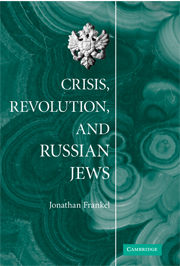Book contents
- Frontmatter
- Contents
- Acknowledgments
- Introduction
- PART I NEW DYNAMICS?
- PART II REVOLUTION AND WAR (1905–1921)
- 3 Jewish Politics and the Russian Revolution of 1905
- 4 “Youth in Revolt”: An-sky's In Shtrom and the Instant Fictionalization of 1905
- 5 Yosef Haim Brenner, the “Half-Intelligentsia,” and Russian-Jewish Politics (1899–1908)
- 6 The Paradoxical Politics of Marginality: Thoughts on the Jewish Situation during the Years 1914–1921
- PART III IDEOLOGICAL CONFLICT AND CONTINUITY
- PART IV OVERSEAS
- PART V HISTORY AND THE HISTORIANS
- Index
6 - The Paradoxical Politics of Marginality: Thoughts on the Jewish Situation during the Years 1914–1921
Published online by Cambridge University Press: 07 August 2009
- Frontmatter
- Contents
- Acknowledgments
- Introduction
- PART I NEW DYNAMICS?
- PART II REVOLUTION AND WAR (1905–1921)
- 3 Jewish Politics and the Russian Revolution of 1905
- 4 “Youth in Revolt”: An-sky's In Shtrom and the Instant Fictionalization of 1905
- 5 Yosef Haim Brenner, the “Half-Intelligentsia,” and Russian-Jewish Politics (1899–1908)
- 6 The Paradoxical Politics of Marginality: Thoughts on the Jewish Situation during the Years 1914–1921
- PART III IDEOLOGICAL CONFLICT AND CONTINUITY
- PART IV OVERSEAS
- PART V HISTORY AND THE HISTORIANS
- Index
Summary
Armistice Day, which every year recalls the end of the First World War on November 11, 1918, attracts little attention nowadays. This fact is, of course, due in part to the passage of time; hardly any war veterans remain alive today to honor their comrades-in-arms who fell in that fearsome conflict.
But there is a far more basic factor involved here. From our present-day vantage point, some seventy years later, the war appears less the finite event that came to an end in 1918 and more the opening episode in a prolonged era of political cataclysm. One world war led inexorably to the next, and both wars brought change of a kind and on a scale that even the most prescient observer could hardly have envisaged early in 1914. Who foresaw that tens of millions of soldiers, mainly conscripts, would lose their lives in the carnage?
Over the space of a mere three decades, the European states that had come to control most of the world since the sixteenth century, ground each other down. When the ancien régime in Central and Eastern Europe collapsed in 1917–18, the vacuum was filled by rival totalitarian systems locked in combat until the one destroyed the other. The post-1945 era saw both the rapid disintegration of the far-flung European empires and hegemony passing to Communist Russia and the United States, now become superpowers.
- Type
- Chapter
- Information
- Crisis, Revolution, and Russian Jews , pp. 131 - 154Publisher: Cambridge University PressPrint publication year: 2008



